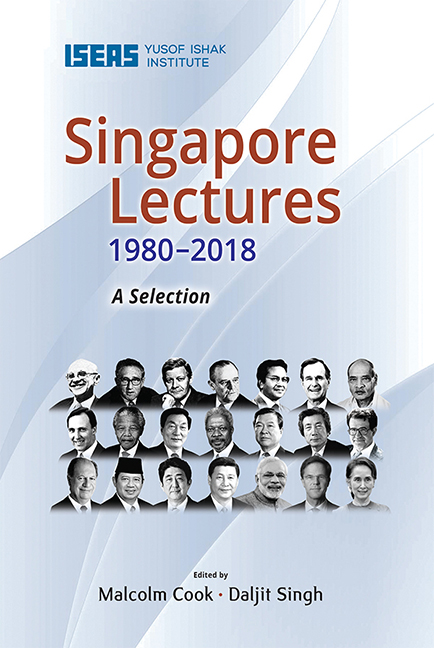Book contents
- Frontmatter
- Contents
- Introduction
- 1 The Invisible Hand in Economics and Politics
- 2 American Foreign Policy: A Global View
- 3 The Soviet Union: Challenges and Responses as Seen from the European Point of View
- 4 Trends in the International Financial System
- 5 Regionalism, Globalism and Spheres of Influence: ASEAN and the Challenge of Change into the 21st Century
- 6 US Policy in the Asia-Pacific Region: Meeting the Challenges of the Post-Cold War Era
- 7 India and the Asia-Pacific: Forging a New Relationship
- 8 Australia, Asia and the New Regionalism
- 9 South and Southern Africa into the Next Century
- 10 China and Asia in the New Century
- 11 Global Values: The United Nations and the Rule of Law in the 21st Century
- 12 Peace on the Korean Peninsula and East Asia
- 13 Japan and ASEAN in East Asia: A Sincere and Open Partnership
- 14 EU and Asia: Sharing Diversity in an Inter-regional Partnership
- 15 Global Challenges in the 21st Century: A View from Chile
- 16 Indonesia: The Challenge of Change
- 17 Japan and ASEAN, Always in Tandem: Towards a More Advantageous Win-Win Relationship through My “Three Arrows”
- 18 Forging a Strong Partnership to Enhance Prosperity of Asia
- 19 India’s Singapore Story
- 20 The Netherlands, Singapore, Our Regions, Our World: Connecting Our Common Future
- 21 Democratic Transition in Myanmar: Challenges and the Way Forward
- The Singapore Lecture Series
- The Editors
17 - Japan and ASEAN, Always in Tandem: Towards a More Advantageous Win-Win Relationship through My “Three Arrows”
Published online by Cambridge University Press: 09 October 2021
- Frontmatter
- Contents
- Introduction
- 1 The Invisible Hand in Economics and Politics
- 2 American Foreign Policy: A Global View
- 3 The Soviet Union: Challenges and Responses as Seen from the European Point of View
- 4 Trends in the International Financial System
- 5 Regionalism, Globalism and Spheres of Influence: ASEAN and the Challenge of Change into the 21st Century
- 6 US Policy in the Asia-Pacific Region: Meeting the Challenges of the Post-Cold War Era
- 7 India and the Asia-Pacific: Forging a New Relationship
- 8 Australia, Asia and the New Regionalism
- 9 South and Southern Africa into the Next Century
- 10 China and Asia in the New Century
- 11 Global Values: The United Nations and the Rule of Law in the 21st Century
- 12 Peace on the Korean Peninsula and East Asia
- 13 Japan and ASEAN in East Asia: A Sincere and Open Partnership
- 14 EU and Asia: Sharing Diversity in an Inter-regional Partnership
- 15 Global Challenges in the 21st Century: A View from Chile
- 16 Indonesia: The Challenge of Change
- 17 Japan and ASEAN, Always in Tandem: Towards a More Advantageous Win-Win Relationship through My “Three Arrows”
- 18 Forging a Strong Partnership to Enhance Prosperity of Asia
- 19 India’s Singapore Story
- 20 The Netherlands, Singapore, Our Regions, Our World: Connecting Our Common Future
- 21 Democratic Transition in Myanmar: Challenges and the Way Forward
- The Singapore Lecture Series
- The Editors
Summary
Prime Minister Shinzo Abe of Japan delivered the 33rd Singapore Lecture on 26 July 2013. He was the third Japanese Prime Minister to do so. His visit to Singapore was his third to Southeast Asia within the seven months since he took office in December 2012, clearly indicating the importance he accorded to the region. He was introduced by Singapore Deputy Prime Minister and Minister for Finance Tharman Shanmugaratnam. The lecture focuses on the Prime Minister's vision of building a new Japan through his reforms and on Japan-ASEAN relations.
Introduction
Deputy Prime Minister, Deputy Chairman Wong Ah Long, Excellencies, Ladies and gentlemen,
I am very grateful to have been invited to deliver this Singapore Lecture. I would also like to express my sincere appreciation to everyone at the Institute of Southeast Asian Studies for affording me this opportunity.
I consider myself to have been presented with a very timely opportunity today, in two or three senses.
Five days ago on Sunday, Japan held an election to select half of the members of our House of Councillors. Today is my first opportunity since the election to deliver a structured talk on the Japanese economy and various other issues.
Most importantly of all, the will to change has returned to Japan, and so has strength. The “revolving door” politics with its high turnover for which Japan is now known has disappeared and is now a thing of the past.
The second sense in which today's address is timely is that three days ago, Japan made its debut in the Trans-Pacific Partnership Agreement process, joining the negotiations underway in Malaysia, your neighbour.
I am intent on Japan expanding the potential of the economy of the Asia-Pacific region further, together with the United States and the other member countries in the negotiations.
The third reason is that this year marks exactly the fortieth year of ASEAN-Japan relations. To commemorate this, Japan has invited the ASEAN heads of state and government to Japan in December, when we will hold a special summit.
Today is therefore a truly ideal opportunity to consider the future of ASEAN-Japan relations.
- Type
- Chapter
- Information
- Singapore Lectures 1980-2018 , pp. 244 - 258Publisher: ISEAS–Yusof Ishak InstitutePrint publication year: 2020



